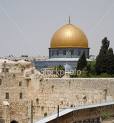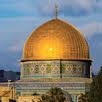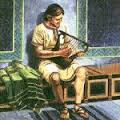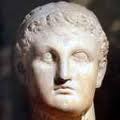
| Next | Previous | Index | Tellout Home |
42. Life After Death
Revelation 11.7-12
"Now, when they have finished their testimony, the Abyss beast will attack, overpower, and kill the two witnesses. Their bodies will lie in the great city's public square, figuratively called Sodom and Egypt, where they crucified their Lord. For three and a half days, people from every tribe, language, and nation will gaze on their bodies and refuse burial. The earth's inhabitants will rejoice over them and celebrate by exchanging gifts because these two prophets had tormented those living on the earth. But after the three and a half days, God's life-breath entered them, and they stood upright, and terror struck those who saw them. Then they heard a loud heavenly voice saying, 'Come up here.' And they went up to heaven in a cloud while their enemies looked on." (Revelation 11.7-12) ✞
Sodom and Egypt
 These events happen in Jerusalem, called by the derogatory name "Sodom and Egypt." Isaiah 1.9-10 also addresses Jerusalem as "Sodom's rulers" and Jerusalem's people as "Gomorrah's people." Sodom and Gomorrah were two Canaanite cities mentioned in Genesis and the Hebrew Bible, New Testament, and the Quran. They were two of the "five plain cities" located at the Dead Sea in southern Israel. Genesis 13.10 compares this fertile plain to the Garden of Eden. Sodom and Gomorrah illustrate in Genesis 19.4-11 the worst types of sin in the story of Lot's family. "Before they lay down, Sodom city's men, both young and old, people from every quarter surrounded the house. They called Lot and said, 'Where are the men who came to you tonight? Bring them out to us that we may have intercourse with them.' But Lot went out to them at the doorway, shut the door behind him, and said, 'Please, my brothers, do not act wickedly.' 'Do nothing to these men since they have come under the shadow of my roof.' But they said, 'Stand aside.' The men inside reached out their hands, brought Lot into the house, and shut the door. They struck the men outside both small and great with blindness at the doorway so that they tired themselves out trying to find the entrance." ✞
These events happen in Jerusalem, called by the derogatory name "Sodom and Egypt." Isaiah 1.9-10 also addresses Jerusalem as "Sodom's rulers" and Jerusalem's people as "Gomorrah's people." Sodom and Gomorrah were two Canaanite cities mentioned in Genesis and the Hebrew Bible, New Testament, and the Quran. They were two of the "five plain cities" located at the Dead Sea in southern Israel. Genesis 13.10 compares this fertile plain to the Garden of Eden. Sodom and Gomorrah illustrate in Genesis 19.4-11 the worst types of sin in the story of Lot's family. "Before they lay down, Sodom city's men, both young and old, people from every quarter surrounded the house. They called Lot and said, 'Where are the men who came to you tonight? Bring them out to us that we may have intercourse with them.' But Lot went out to them at the doorway, shut the door behind him, and said, 'Please, my brothers, do not act wickedly.' 'Do nothing to these men since they have come under the shadow of my roof.' But they said, 'Stand aside.' The men inside reached out their hands, brought Lot into the house, and shut the door. They struck the men outside both small and great with blindness at the doorway so that they tired themselves out trying to find the entrance." ✞
Divine Judgment
 In the Genesis account, fire and brimstone consumed Sodom and Gomorra and four of the plain's cities. Neighboring Zoar was the only city spared. Historically, Sodom and Gomorrah developed in modern discourse as metaphors for homosexuality and lust. The Lord's brimstone and fire destroyed the two cities. Lot's wife disobeyed the angels, looked back at the town, and became a salt pillar. So Jerusalem is allegorized as "Sodom and Egypt," which were bywords for destruction, shame, and punishment. ✞
In the Genesis account, fire and brimstone consumed Sodom and Gomorra and four of the plain's cities. Neighboring Zoar was the only city spared. Historically, Sodom and Gomorrah developed in modern discourse as metaphors for homosexuality and lust. The Lord's brimstone and fire destroyed the two cities. Lot's wife disobeyed the angels, looked back at the town, and became a salt pillar. So Jerusalem is allegorized as "Sodom and Egypt," which were bywords for destruction, shame, and punishment. ✞
The Two Witnesses
 Here in Revelation, we return to the two witnesses. "Now, when they have finished their testimony, the Abyss Beast will attack, overpower, and kill them. Their bodies will lie in the great city's public square." The Abyss Beast killed the two witnesses, and their bodies remained on the Jerusalem streets for three and a half days. Even worse, the people's hatred for God's witnesses will be such that they will regard the witnesses' death as a reason for celebration and exchange gifts. Though they had died, God's life-breath then entered them after three and a half days, and they rose from the dead. God's "life breath" may mean here the "life spirit" or the Holy Spirit. The word for "breath" may equally be "wind or spirit" and is the same word used in the Creation story of the Spirit moving over the waters. ✞
Here in Revelation, we return to the two witnesses. "Now, when they have finished their testimony, the Abyss Beast will attack, overpower, and kill them. Their bodies will lie in the great city's public square." The Abyss Beast killed the two witnesses, and their bodies remained on the Jerusalem streets for three and a half days. Even worse, the people's hatred for God's witnesses will be such that they will regard the witnesses' death as a reason for celebration and exchange gifts. Though they had died, God's life-breath then entered them after three and a half days, and they rose from the dead. God's "life breath" may mean here the "life spirit" or the Holy Spirit. The word for "breath" may equally be "wind or spirit" and is the same word used in the Creation story of the Spirit moving over the waters. ✞
Life After Death
 Jerusalem's wickedness had already crucified Jesus Christ, and in coming days it was to welcome his witnesses' death joyfully. Revelation records that Jerusalem's people "will so hate the two witnesses that they leave their bodies unburied in the street." In Jewish tradition, it was a terrible thing for a person not to receive an immediate burial. A lasting, most profound memory for me in the tragic New Orleans flooding was the television pictures of corpses lying on the pavement, housetops, and a woman floating face down in the water. This kind of death also reminds me of Ezekiel 37.5 and the valley of dry bones. "This is what the Sovereign Lord says to these bones: I will make breath enter you, and you will come to life." John of Patmos adds of the resuscitation of the two witnesses from death, "terror struck those who saw it." ✞
Jerusalem's wickedness had already crucified Jesus Christ, and in coming days it was to welcome his witnesses' death joyfully. Revelation records that Jerusalem's people "will so hate the two witnesses that they leave their bodies unburied in the street." In Jewish tradition, it was a terrible thing for a person not to receive an immediate burial. A lasting, most profound memory for me in the tragic New Orleans flooding was the television pictures of corpses lying on the pavement, housetops, and a woman floating face down in the water. This kind of death also reminds me of Ezekiel 37.5 and the valley of dry bones. "This is what the Sovereign Lord says to these bones: I will make breath enter you, and you will come to life." John of Patmos adds of the resuscitation of the two witnesses from death, "terror struck those who saw it." ✞
No One to Bury You
 To the Psalmist, when the heathen attack and kill God's people, the greatest tragedy is that no one will bury them. Psalm 79.1-4 says, "O God, the nations have invaded your inheritance; they have defiled your holy temple and reduced Jerusalem to rubble. They have left your servants' dead bodies as food for the birds of the sky, your people's flesh for the wild animals. They have poured blood out like water around Jerusalem, and there is no one to bury the dead. We are objects of contempt to our neighbors, scorn, and derision to those around us." The greatest threat to a disobedient prophet is that his fathers' burial tomb would not contain his remains. In 1 Kings 13.20-26, we read, "The Lord says: 'You have defied the Lord's word and not kept the command the Lord your God gave you. You came back, ate bread, and drank the water where he told you not to eat or drink. Therefore your body will not be buried in your ancestors' tomb.'" ✞
To the Psalmist, when the heathen attack and kill God's people, the greatest tragedy is that no one will bury them. Psalm 79.1-4 says, "O God, the nations have invaded your inheritance; they have defiled your holy temple and reduced Jerusalem to rubble. They have left your servants' dead bodies as food for the birds of the sky, your people's flesh for the wild animals. They have poured blood out like water around Jerusalem, and there is no one to bury the dead. We are objects of contempt to our neighbors, scorn, and derision to those around us." The greatest threat to a disobedient prophet is that his fathers' burial tomb would not contain his remains. In 1 Kings 13.20-26, we read, "The Lord says: 'You have defied the Lord's word and not kept the command the Lord your God gave you. You came back, ate bread, and drank the water where he told you not to eat or drink. Therefore your body will not be buried in your ancestors' tomb.'" ✞
Three and a Half Days
 For three and a half days, the two witnesses lie dead on the streets, and the people refuse them burial. Then suddenly, they are made alive by God and taken to heaven. The number "three and a half" indicates that something substantial is about to happen at the end of this time. It is not three half days but three full days and a half of a day. "After three and a half days," breath returned to the two witnesses, and they stood up much to the crowd's astonishment and terror. As the people watched, God summoned them into heaven. Being taken up in a cloud also reminds us of Elijah's heavenly departure in 2 Kings 2.11 "As Elijah and Elisha were walking along and talking together, suddenly a chariot and horses of fire appeared and separated the two, and in a whirlwind, Elijah went up to heaven." ✞
For three and a half days, the two witnesses lie dead on the streets, and the people refuse them burial. Then suddenly, they are made alive by God and taken to heaven. The number "three and a half" indicates that something substantial is about to happen at the end of this time. It is not three half days but three full days and a half of a day. "After three and a half days," breath returned to the two witnesses, and they stood up much to the crowd's astonishment and terror. As the people watched, God summoned them into heaven. Being taken up in a cloud also reminds us of Elijah's heavenly departure in 2 Kings 2.11 "As Elijah and Elisha were walking along and talking together, suddenly a chariot and horses of fire appeared and separated the two, and in a whirlwind, Elijah went up to heaven." ✞
Three and a Half Years
 Sometimes, the Scriptures write "three and a half years" as "forty-two months" or "one thousand two hundred and sixty days" as symbolic of an incomplete time after which something substantial is going to happen. Forty-two months was the duration of the vicious Jewish persecution by Antiochus IV Epiphanes (BC 215-164) in BC c167. The Greek king Antiochus ruthlessly persecuted Judean and Samarian Jewish followers and the Jewish Maccabees. His contemporaries disparagingly called Antiochus "Epimanes" or "the Mad One," a wordplay on "Epiphanes." ✞
Sometimes, the Scriptures write "three and a half years" as "forty-two months" or "one thousand two hundred and sixty days" as symbolic of an incomplete time after which something substantial is going to happen. Forty-two months was the duration of the vicious Jewish persecution by Antiochus IV Epiphanes (BC 215-164) in BC c167. The Greek king Antiochus ruthlessly persecuted Judean and Samarian Jewish followers and the Jewish Maccabees. His contemporaries disparagingly called Antiochus "Epimanes" or "the Mad One," a wordplay on "Epiphanes." ✞
Life After Death
 Have you ever wondered about life after death? Death is stone cold and seemingly final. The organs and brain stop and close down, the heart's pumping slows to zero, and brain waves falter and eventually cease. For the Christian, life after death is like a new birth when a baby emerges from its mother's womb. Though the whole world rejoices at the two witnesses' deaths, they finally triumphantly ascend to heaven. Every committed Christian will experience this resurrection and enjoy heavenly life with God! Titus ordered Jerusalem's destruction in 70 AD, slaughtered a million Jewish people, and plundered the temple treasures. Maybe John of Patmos wants the Christian victims to know that these one million deaths were not in vain. Perhaps he wanted them to understand the reality of life after death. ✞
Have you ever wondered about life after death? Death is stone cold and seemingly final. The organs and brain stop and close down, the heart's pumping slows to zero, and brain waves falter and eventually cease. For the Christian, life after death is like a new birth when a baby emerges from its mother's womb. Though the whole world rejoices at the two witnesses' deaths, they finally triumphantly ascend to heaven. Every committed Christian will experience this resurrection and enjoy heavenly life with God! Titus ordered Jerusalem's destruction in 70 AD, slaughtered a million Jewish people, and plundered the temple treasures. Maybe John of Patmos wants the Christian victims to know that these one million deaths were not in vain. Perhaps he wanted them to understand the reality of life after death. ✞
"Life After Death"
by Ron Meacock © 2021
| ^Top Page | Next | Previous |